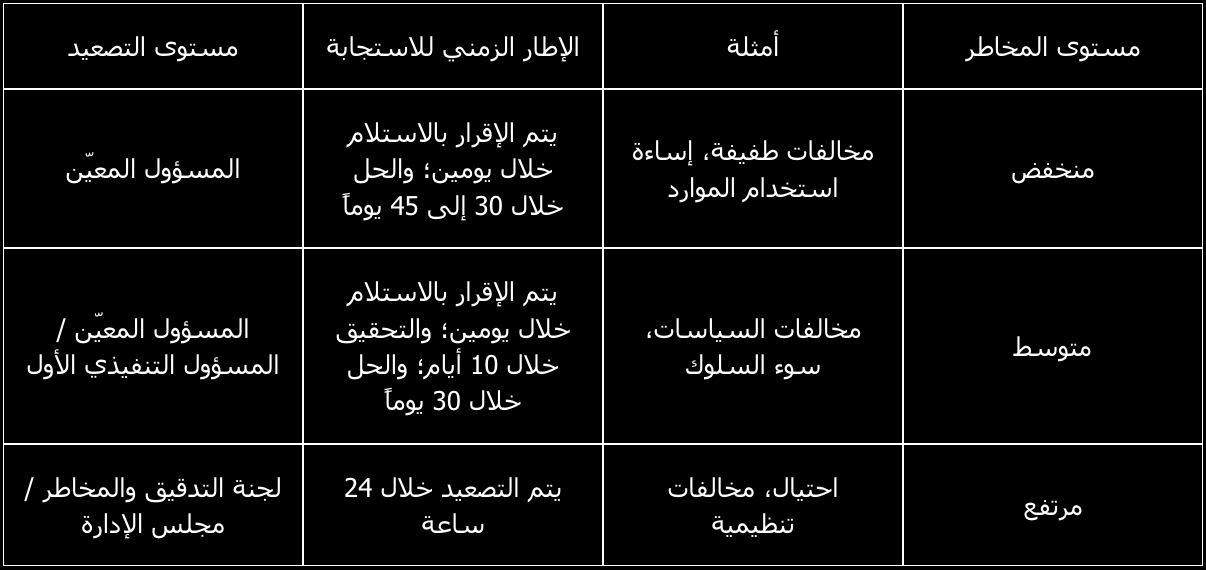سياسة الإبلاغ عن المخالفات
المقدمة
تلتزم شركة The Family Office Co. BSC(c) ("الشركة" أو "نحن") بأعلى معايير النزاهة والشفافية والمساءلة في جميع جوانب عملياتها. توضح هذه السياسة الإطار الذي يمكن من خلاله لأصحاب المصلحة، بما في ذلك الموظفين والمقاولين والمورّدين والعملاء والأطراف الأخرى ذات الصلة، الإبلاغ عن أي اشتباه بسلوك مخالف أو غير أخلاقي أو مخالف للأنظمة بطريقة آمنة وسرّية.
تهدف هذه السياسة إلى ضمان حماية الأفراد الذين يقدّمون بلاغاتهم بحسن نية من أي انتقام، وأن تتم معالجة جميع البلاغات بأقصى درجات الجدية والسرية والعدالة في الإجراءات.
قد يتم تحديث هذه السياسة بشكلٍ دوري. يُرجى الرجوع إلى أحدث نسخة منشورة على موقعنا الإلكتروني للتعرّف على الإجراءات والحمايات المعمول بها حالياً.
1. نطاق الإبلاغ عن المخالفات
يشير الإبلاغ عن المخالفات إلى الإبلاغ عن مخاوف جدّية قد تؤثر سلباً على عمليات الشركة أو سمعتها أو التزاماتها التنظيمية. قد تنشأ هذه المخاوف من أفعال أو امتناع عن أفعال من قبل أي طرف له علاقة بأنشطة الشركة، بما في ذلك الموظفين أو المقترضين أو المروّجين أو المقاولين أو المورّدين أو المستفيدين أو أصحاب المصلحة الآخرين.
تشمل الأمثلة على المخاوف القابلة للإبلاغ عنها، على سبيل المثال لا الحصر:
الاحتيال أو الرشوة أو الفساد
التلاعب أو الأخطاء في التقارير المالية
مخالفات قانونية أو تنظيمية أو داخلية
سلوك غير أخلاقي أو غير قانوني
مخاطر تتعلق بالصحة والسلامة
مخالفات بيئية
التعمّد في إخفاء أي من الحالات أعلاه
ولا تهدف هذه السياسة إلى معالجة الشكاوى المتعلقة بعلاقات العمل، إذ ينبغي التعامل معها من خلال قنوات الموارد البشرية.
2. قنوات الإبلاغ
يمكن لأصحاب المصلحة الإبلاغ عن المخاوف من خلال القنوات السرّية التالية:
الهاتف: +973 17576773 (المسؤول المعيّن)
البريد الإلكتروني: [email protected]
البريد: موجّه إلى المسؤول المعيّن، برج الزامل، الطابق التاسع، شارع الحكومة، مبنى رقم 305، المنامة، مملكة البحرين
الموقع الإلكتروني: عبر موقع الشركة، مع إمكانية الإبلاغ بشكل مجهول الهوية
كما يمكن للأطراف الخارجية تقديم البلاغات من خلال الموقع الإلكتروني أو البريد.
3. المسؤول المعيّن
يتولى رئيس الامتثال في المجموعة مهمة المسؤول المعيّن لتلقّي بلاغات الإبلاغ عن المخالفات والتحقيق فيها ورفعها للجهات المختصة. يحتفظ المسؤول المعيّن بسجلّ لجميع البلاغات ويقدّم ملخصاً عنها إلى لجنة التدقيق والمخاطر مرتين سنوياً.
4. عملية الإبلاغ والتصعيد
يمكن لأصحاب المصلحة رفع مخاوفهم إلى جهة الاتصال الأساسية لديهم في الشركة. وإذا لم يكن ذلك مناسباً، يمكنهم التواصل مباشرة مع المسؤول المعيّن. وفي الحالات الحسّاسة، يمكن تصعيد البلاغ إلى الرئيس التنفيذي أو نائب الرئيس التنفيذي أو رئيس لجنة التدقيق والمخاطر.
تُصنّف البلاغات وفق مستوى المخاطر ويتم التعامل معها تبعاً لذلك.

. إجراءات التحقيق
تعتمد طبيعة ونطاق التحقيق على خطورة المخالفة المبلّغ عنها. قد تُحال القضايا عالية المخاطر إلى خبراء خارجيين لإجراء مراجعة مستقلة. توثّق جميع التحقيقات وتُراجع من قبل لجنة التدقيق والمخاطر، مع إمكانية رفعها إلى مجلس الإدارة إذا لزم الأمر.
6. حماية المبلّغين
تضمن الشركة الحماية الكاملة للمبلّغين الذين يقدّمون بلاغاتهم بحسن نية، بما في ذلك:
الحماية من الفصل أو خفض الدرجة الوظيفية أو المضايقة أو الانتقام
الحفاظ على سرية الهوية إلا في الحالات التي يتطلّب فيها القانون الكشف عنها
مراقبة معاملة المبلّغ أثناء التحقيق وبعده
تعيين جهة دعم لمتابعة أي حالات انتقام محتملة
وإذا ثبت أن البلاغ قُدّم بسوء نية أو دون أساس واقعي، تحتفظ الشركة بحقها في اتخاذ الإجراءات التأديبية المناسبة.
7. السرّية
تتعامل الشركة مع جميع البلاغات بسرّية تامة، ولا يتم الكشف عن هوية المبلّغ إلا في الحالات التالية:
بموافقة المبلّغ
إذا كان القانون يتطلّب ذلك
إذا كان الكشف ضرورياً لإجراء التحقيق بفعالية
إذا كان للشخص المبلّغ عنه حق قانوني في معرفة التفاصيل
وفي جميع الحالات، يتم إبلاغ المبلّغ مسبقاً بأي إفصاح عن هويته.
8. محتوى البلاغ
يجب أن يتضمّن كل بلاغ ما يلي:
تاريخ استلام البلاغ
ملخّص للمخاوف المبلّغ عنها
الخطوات المتخذة للتحقيق
إجراءات الحفاظ على السرّية
الأفراد المطلعين على البلاغ
نتائج التحقيق ومبرّراتها
قرارات الإفصاح للجهات التنظيمية
المستندات الداعمة
9. حفظ السجلات
تُحفظ جميع البلاغات والمستندات ذات الصلة بشكل آمن وفقاً لسياسة حفظ السجلات لدى الشركة والقوانين المعمول بها. ويقتصر الوصول إلى هذه السجلات على الأشخاص المخوّلين فقط.
10. المراقبة والامتثال
تتابع لجنة التدقيق والمخاطر فعالية هذه السياسة من خلال مؤشرات الأداء التالية:
عدد البلاغات المستلمة
مدة التحقيقات
الإجراءات التصحيحية المتخذة
ويتحمّل رؤساء الأقسام مسؤولية توعية فرقهم بهذه السياسة، كما يتم تعريف جميع أصحاب المصلحة الجدد بها خلال عملية الانضمام.
11. الحقوق الإضافية
قد يتمتع المبلّغون بحقوق إضافية وفقاً للقوانين السارية، بما في ذلك:
قانون حماية البيانات الشخصية في مملكة البحرين رقم 30 لسنة 2018
قانون حماية البيانات في مركز دبي المالي العالمي رقم 5 لسنة 2020
نظام الهيئة السعودية للبيانات والذكاء الاصطناعي رقم م/19 لسنة 2021